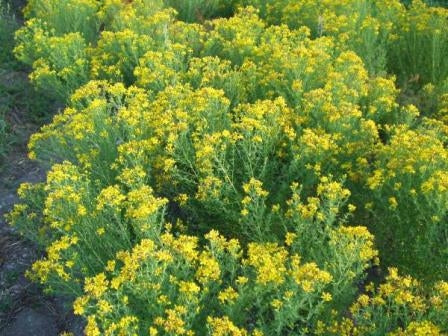ST. JOHN'S WORT - kr19
Have a question?

ST. JOHN'S WORT - kr19
Dettagli
Scientific name and part of plant used: St. John's wort (Hypericum perforatum L.) flowering tops

St. John's wort (Hypericum perforatum L.), otherwise known as St. John's wort or devil's wort, is a herbaceous plant belonging to the Hypericaceae family.
St. John's wort is native to Europe, but today it is also widespread in other parts of the world. St. John's Wort grows well in sunny areas and on uncultivated fields.
St. John's wort is used in phytotherapy for internal use for its properties
anti-inflammatory, antiseptic, antidepressant, antiviral, soothing and healing, while for external use it boasts photoprotective, soothing, healing, astringent and eudermic properties.
St. John's Wort is therefore used internally in the treatment of depression, dystonia, gastritis and ulcers. For external use, St. John's Wort is suitable for protecting the skin from the sun's rays, for hydrating dry skin, for greasy or devitalized hair, for sores, burns, ulcers and itching.
The parts of the plant used in phytotherapy are: the flowering tops made up of flowers, leaves and pieces of stem (aerial parts). The characterizing active ingredients are flavonoids (hyperin, rutin, quercetin, biflavones), naphthodiantrons (hypericin, pseudohypericin, isohypericin, protohypericin), hyperforin, essential oil, tannins and procyanidins in modest quantities.
St. John's Wort: method of use, dosages, formulations and use in herbal teas
In modern phytotherapy, St. John's Wort is used in the form of titrated dry extracts, infusions, decoctions, glycolic extract, oily extract and mother tincture. The relative doses normally recommended are equal to: 2-4 grams of the drug St. John's wort per day or 0.2-1 mg of hypericin; for other forms of administration, 2-4 grams of drug in 150 ml of boiling water (infusion), 5 grams of drug St. John's Wort in 100 ml of boiling water (5% infusion for external use), 10 grams of drug in 100 ml of water (decoction), 300-900 mg of dry St. John's wort extract per day, 50 drops of St. John's wort mother tincture three times a day.
St. John's Wort can cause side effects such as changes in the menstrual cycle and skin erythema. Possible drug interactions due to inhibition of the activity of cytochrome P450 and all its isoenzymes
The use of St. John's Wort is contraindicated during pregnancy and breastfeeding. Avoid taking St. John's wort products during treatment with antidepressant drugs and oral anticoagulants.
The use of St. John's wort in herbal teas finds space for its anti-inflammatory, antiseptic, antidepressant, antiviral, soothing and healing properties. St. John's wort oil is useful as an anti-inflammatory and healing liniment for external use. Tinctures have been found to be useless or dangerous if used to replace safer drugs or herbal products. Currently the most effective and safe formulation for taking St. John's wort is the dry extract standardized in flavonoids (50%) and hyperforin (5%), rather than extracts titrated in hypericin at 0.3%. Conversely, traditional herbal preparations such as herbal teas, infusions, juices and decoctions do not allow the exact quantity of active ingredients administered to the patient to be established, which increases the risk of therapeutic failure. In fact, in a herbal tea, the quantities of active ingredients extracted can be excessive or more commonly insufficient, in addition to the risk of extracting unwanted components.
Below are some examples of popular herbal teas that contain the flowering tops (aerial parts) of St. John's Wort.
St. John's wort in herbal teas
Herbal tea against depression with St. John's wort
You might be interested in: http://www.my-personaltrainer.it/Tisane/Ingrediente/Iperico_hypericum_Perforatum_LSommit_Fiorite.html


